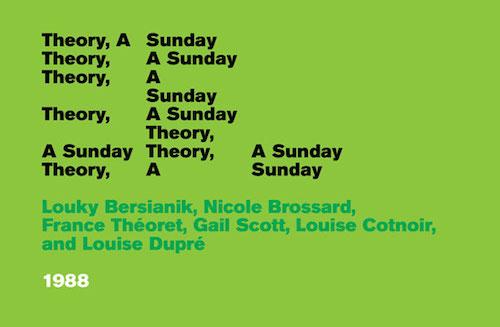What a New Feminist Consciousness Looked Like for Montréal

At Jacket2, we're glad for Maggie Zurawski writing about Theory, A Sunday (Belladonna 2013), the recently translated version of a remarkable Canadian book on feminism and poetics that came out of--25 years ago--a women's writers group in Montréal started by Nicole Brossard that included Louise Cotnoir, Gail Scott, Louise Dupré, France Théoret, and Louky Bersianik.
This publication, we should note, marks the first in Belladonna's new Germinal Texts series. "In the afterword," Zurawski writes, "Belladonna founder Rachel Levitsky stresses the importance of the 'Canadian feminist avant-garde' for offering her a model for expanding the politics of an experimental American literary scene that, in the aftermath of Language poetry, believed 'language dissonance and disruption was political in and of itself' (152–53)."
While it's not all timely, Zurawski finds the bright points, mentioning that, for instance, "[f]ans of Gail Scott will be excited to read her essay 'A Feminist at the Carnival'”--this comes back around when Zurawski recognizes how this work can inform our thinking about the creation of new feminist spaces today (which a lot of us are doing, no?):
Such theoretical headiness [re: feminist consciousness], Gail Scott reminds us in her remarks in the afterword, emerged not from isolated intellectual practices, but from fruitful Sunday gatherings, suggesting that the community produced through this collective study became at least in a partial way an answer to what a new feminism and a new feminist consciousness might look like:
Arriving at noon at someone’s house, each brought a page in French on a topic … The texts were the product of our most recent discoveries in writing, in reading, or had been scored in the heat of political intervention … During the discussion of our texts, we drank coffee, then out came the wine and the food, so the discussions evolved into a kind of camaraderie of sharing and reflection. I remember the meetings that lasted from noon till almost midnight, full of passion and instruction. (151)
In her affectionate introduction to the book, Lisa Robertson emphasizes that these efforts, which took place in the city outside of the auspices of any academic institution, forever altered the landscape of Montreal. She writes, “Thinking about and reading the work of these Montreal women now, twenty-five years later, I am brought to the realization that feminism is one of the scintillating companions of the culture of cities. Feminist culture, discourse, and resistance has shaped contemporary urban experience and urban space” (11). Robertson’s understanding of feminist intellectual activity as a means of altering urban space once again underlines the fact that the publication of these texts continues a dialogue between generations of avant-garde women writers in North America.
Yes yes yes. Read all of "Montreal's was a desiring feminism" at Jacket2, and more on the book at SPD.


